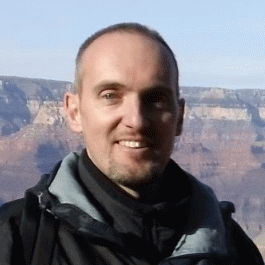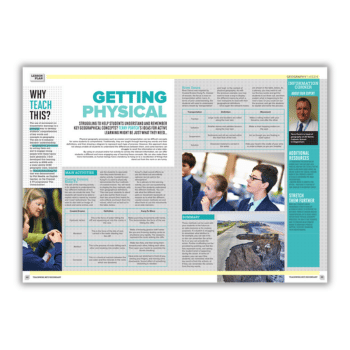Geography and elitism – Why diverse thinking is key to making the subject inclusive

To become a more inclusive subject, geography should focus less on the partisan and do more to prioritise the universal, writes Alex Standish

- by Dr Alex Standish
- Associate professor of geography education at UCL Institute of Education

In recent years, we’ve seen much concern expressed over the need for schools and universities to ‘widen participation’ in certain subjects; to move away from Anglo-centrism and ensure that a range of ethnicities and genders are ‘represented’ in the curriculum.
These calls have often led to demands for disciplinary knowledge to be ‘decolonised’, but it’s important to ensure that curriculum subjects retain their appeal to all young people – regardless of background – so that everyone can have equal access to the fruits of knowledge and culture.
The ‘soft option’?
Geography is a subject that’s long struggled to reflect the multicultural and class constitution of British society. From the 19th to the early 20th century, geography teaching supported and furthered the ideology and practices of the British Empire overseas. The geographer Halford Mackinder once described it as a subject for learning how to ‘think Imperially’ and see the world as a ‘theatre for British activity’.
More recently, Danny Dorling, professor of human geography at the University of Oxford, has written about how geography became the degree of choice for students from privileged backgrounds. In his paper Kindness: A new kind of rigour for British Geographers, Dorling traces the subject’s links with privilege back to the 1970s. This was a time when public school families increasingly expected their offspring to attend university and obtain a degree, and came to view geography as a ‘soft option’ (which it wasn’t then and isn’t now).
In a similar vein, Alex Singleton, professor of geographic information science at the University of Liverpool, carried out a geodemographic analysis of GCSE entries in 2012 to reveal that pupils living in more affluent and less ethnically diverse areas recorded the highest rates of participation and attainment in GCSE geography.
(While objections to the term ‘Black and Minority Ethnic’ are understandable and noted, this is the form in which data is often collected, hence ‘BME’ will be tentatively used here).
Shedding the privilege
Today, the numbers of students from BME backgrounds taking geography in higher education is low, compared with those who are Caucasian British. According to research by Vandana Desai of Royal Holloway University of London, approximately 20% of all UK-domiciled higher education students are from BME backgrounds, compared to 13% of the general population. Yet only 6 to 7% percent of those BME students are studying geography.
The figures for university teaching staff are even more skewed, with 4.4% from BME backgrounds overall, only 1.4% of whom are professors. Geographers evidently have some work to do if they want to shed the subject’s association with privilege and widen participation.
Further research in 2018 by Hafsa Garcia of UCL Institute of Education found that differences in attitudes towards geography among A-Level students could be linked to cultural background. Students of Indian and Chinese heritage, for example, were more likely to select geography at GCSE level.
Conversely, other ethnic groups – particularly Bangladeshi and Black students – tended to view the subject negatively, as not offering good career prospects. One respondent to Garcia’s research explained that for her, geography is “An easy subject that doesn’t result in high profile or high paying jobs.”
This is a helpful starting point for recognising that some of the differences identified in the data derive from differences in cultural outlook towards education. Rather than getting us off the hook, however, it suggests that geographers need to convince a broader range of people of the subject’s value, including its links to careers.
Signs of change
That said, there are at least some signs of change within schools. The Royal Geographical Society has found that between 2010 and 2018, the number of Black/Black British students taking geography had doubled from 18.6% to 37.3%. The proportion of Asian and mixed student entries grew slightly, but turned out to be highest among pupils of Chinese ethnicity (52%).
Overall, entries from pupils with a BME background accounted for 23% of all 2018 GCSE geography entries, compared with an ethnic minority school population of 30% in England. Entries for pupils from poorer families (those eligible for free school meals) still remains lower than other groups, but the gap between them has at least narrowed from 14.4% in 2013 to 11.1% in 2018.
Trending
While much of this is probably linked to shifting cultural attitudes between generations, the knowledge-rich geography curriculum in place since 2013 has hopefully also played a part. The RGS and Geographical Association (GA) have both formed committees and devised projects aimed at widening participation, while also undertaking listening exercises to survey young people’s views of geography and its institutions.
Efforts have additionally been made to co-opt more geographers from BME and lower socio-economic backgrounds into positions of responsibility and encourage them to write for journals. The RGS runs a project aimed at disseminating geography-related careers information; the GA has added a prayer room at its annual conference. Small steps, but thoughtful ones.
Different priorities
However, too many geographers continue to place privileged, middle-class political preoccupations and Western-centric views at the heart of the subject, seemly unaware that many outside of academia think somewhat differently.
Scanning the pages of some recent geography education journals reveals a series of prominent articles promoting environmentalism, climate activism, decolonisation of the curriculum and identity politics – thus illustrating the continuing influence of postmodern thought, including postcolonial theory and scepticism towards economic development.
For instance, while climate change continues to be a dominant issue in geography, the UN’s global ‘We the People: 7 million voices’ survey actually found that this was a low political priority for most people, ranking behind access to food, healthcare, job opportunities, education, clean water, sanitation, energy, equality and reliable government.
Climate change is a big issue that needs to be addressed, of course – but by presenting the issue in ways consistent with the beliefs and perspectives of radical organisations, there are some within the profession who risk being out of touch with the priorities of wider society.
Open to diversity
In a 2016 article titled ‘The Challenges of Environmental Education’, geographer Charles Rawding expressed his concerns regarding the subject’s promotion of Green and anti-capitalist ideology, and whether these might be fostering an anti-modern, anti-development view of the world. Rawding rightly concluded that “An uncritical adherence to such an orthodoxy will result in negative geographies.”
Partisanship and activist teaching may well attract like-minded students, but will likely discourage those who prioritise other issues and express different political opinions. Teachers should encourage students to explore many contemporary political issues in geography. However, to avoid indoctrination, this means examining different perspectives and alternative ways of thinking, such that students can formulate their own views and learn to empathise with others.
In academic settings, moral and political questions should be opened up to include diverse ways of thinking about the issues at hand. It is only through being open to diverse ideas that geography will ultimately establish that path towards wider participation – a lesson that needs to start in school.
Alex Standish is an associate professor of geography education at UCL Institute of Education, and co-editor of What Should Schools Teach? Disciplines, Subjects and the Pursuit of Truth (UCL Press)










